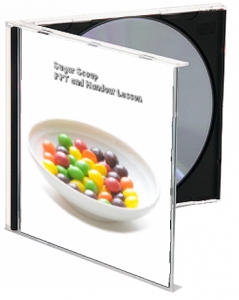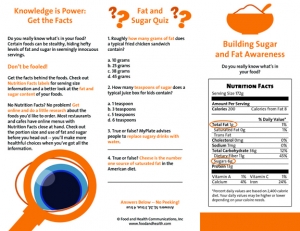Fed Up: A Review
The tagline for the movie “Fed Up” sums up its message: “It’s time to get real about food.”The 99-minute film, directed by Stephanie Soechtig and narrated by Katie Couric, starts by asking: What if our approach to obesity has been wrong?Stories of several overweight teens and their family’s struggles with weight loss are peppered throughout segments with well-known researchers, nutritionists, authors, and politicians. All the interviewees offer their views on weight and weight loss. For example, Robert Lustig, MD, Professor at the University of California's San Francisco School of Medicine, states that there is good data that shows a calorie does NOT equal a calorie. He goes further, explaining that the idea that weight loss as primarily one of eating less and exercising more misses the bigger picture of metabolism, biochemistry, and genetics.The movie focuses on the sugar content of foods, the role of sugar-sweetened beverages, processed food, and a predominantly junk-food environment in fueling obesity. The spotlight is focused squarely on the advertising and food industries that encourage children to choose sweetened foods and beverages.President Bill Clinton mentions that the government also plays a large part in subsidizing corn so that cheap, tasty sweeteners are readily available. At the same time, the government doesn’t go far enough in requiring healthy meals in schools.“Fed Up” delves into other areas that it maintains play a role in obesity and health as well. For example, the film...
- Compares food advertising to tobacco advertising in the early to mid-1900’s. It concludes that until junk food advertising is severely limited, rates of obesity will continue to rise.
- Applauds First Lady Michelle Obama for bringing childhood obesity and nutritious school meals to the forefront. At the same time, it implies that she purposely focuses on exercise in the Let’s Move! initiative to avoid offending food companies that make large campaign contributions.
- Shows the food industry sponsoring scientific research that promotes their less-than-healthful products.
- Delves into the 1977 Senate Select Committee on Nutrition and Human Needs. The committee was led by George McGovern and established dietary guidelines that were then rejected by the government and food industry as too severe. A much more watered-down version was later released to the public. Many experts point to these initial dietary guidelines as starting the low-fat food craze that did nothing to stem obesity yet increased sugar consumption from processed foods.
- Makes a case that sugar is more addictive than cocaine. It also discusses how exposing young children to sweetened foods and beverages makes them crave sugar even more.
- Explores the conflicted role of government, which, according to Miriam Nestle, MPH, PhD, Professor in the Department of Nutrition, Food Studies, and Public Health at New York University, encourages eating healthful fruits and vegetables while at the same time providing agriculture funding to produce more corn used for sweeteners.
“Fed Up” paints a grim picture.Apparently we’re stuck with added sugar in almost everything -- roughly 80% of food items. There's junk food everywhere, even at the check-out counters of dollar stores and hardware stores. Somehow we’ve come to the point where private and corporate profits take precedence over public health.The overweight teens tug at our emotions, talking about the unfairness of their thin friends eating endless amounts of junk food and the difficulty of being constantly surrounded by foods high in sugar and fat. One teen commented that we don’t expect alcoholics to sit in a bar and remain sober, yet we somehow expect overweight people to simply ignore all of the high-calorie foods surrounding them.I found it particularly depressing to hear parents of these overweight teens commenting that they feel they have no control over their children’s food choices and that they are conned by the food industry into purchasing low-fat processed food instead of healthier fruits and vegetables. What happened to personal choice and responsibility?I watched “Fed Up” with three of my running buddies, women who exercise on a regular basis and raise their families to eat an overall healthful diet. With this group, I would be able to get an evaluation of the movie from non-health care professionals too. What did they see? Well...
- They were surprised at the laundry list of sugary ingredients listed on a food label, and didn’t realize the amount of added sugar that is present in many foods.
- They also didn’t realize that food labels do not list the amount of added sugars in food, or that there isn’t a recommended upper limit for sugar on a food label.
- During the segment comparing low-fat and reduced-fat food items next to the original food, each of the women was shocked at the small calorie difference. They liked Mark Hyman’s comment: “Junk is still junk even if it’s less junky”.
- They expressed disgust at the food industry representatives who tried to sugar-coat offering processed foods to children, even in school lunch programs. Does anyone truly believe that French fries and pizza sauce are nutritious vegetables?
My friends’ overall response to “Fed Up” was that educating the public, especially parents and others who are responsible for feeding children, is crucial to prevent obesity and chronic illnesses that are often the result of obesity, poor eating habits, and too little physical activity.We can blame the advertising industry, government, grocery stores and schools or we can start by taking responsibility for our family’s health in our own homes.By Lynn Grieger RDN, CDE, CPT, CWCThere are other ways to increase people's understanding of exactly what's in their food! Check out these awareness-buliding resources...



